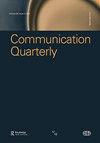Emerging adults’ financial conversations with parents as mediators of family communication patterns and financial Independence
IF 1
Q2 COMMUNICATION
引用次数: 1
Abstract
ABSTRACT This study examined emerging adults’ financial conversations with parents as mediators of family communication patterns (FCPs) (i.e., family conversation and conformity orientations) and emerging adults’ financial independence (i.e., financial autonomy and self-efficacy). Participants included 202 emerging adults ages 18 to 25. Whereas conversation orientation positively predicted both financial self-efficacy and autonomy, conformity orientation positively predicted only financial autonomy. Indirect associations emerged between both FCP orientations and financial autonomy via the frequency of financial conversations with mother, whereas indirect associations between both FCP orientations and financial self-efficacy emerged via financial conversations with father. The findings extend FCP theory by illuminating distinct explanatory pathways from the family communication environment to financial socialization in emerging adults.新兴成年人与父母的财务对话是家庭沟通模式和财务独立性的中介
摘要本研究考察了新兴成年人与父母的财务对话作为家庭沟通模式(FCPs)(即家庭对话和从众取向)和新兴成年人财务独立性(即财务自主性和自我效能感)的中介。参与者包括202名年龄在18至25岁之间的新兴成年人。会话取向对财务自我效能和自主性都有正向预测,而从众取向只对财务自主性有正向预测。FCP取向和财务自主权之间通过与母亲的财务对话频率出现间接关联,而FCP取向与财务自我效能之间通过与父亲的财务对话出现间接关联。研究结果通过阐明从家庭沟通环境到新兴成年人财务社会化的不同解释途径,扩展了FCP理论。
本文章由计算机程序翻译,如有差异,请以英文原文为准。
求助全文
约1分钟内获得全文
求助全文

 求助内容:
求助内容: 应助结果提醒方式:
应助结果提醒方式:


